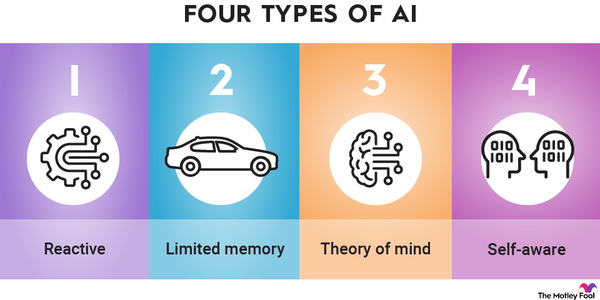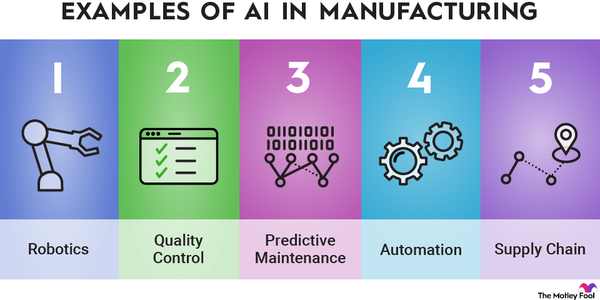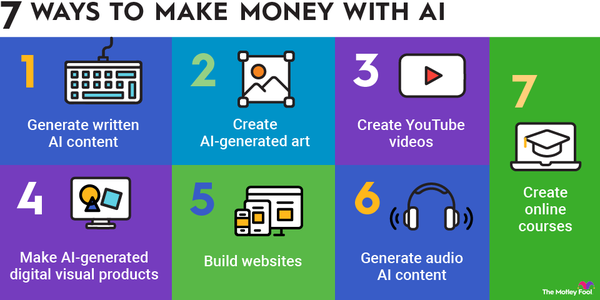Artificial intelligence (AI) is everywhere in the business world these days, and there are plenty of companies using AI, just as there are investors looking to capitalize on the opportunities with the new technology.
Anyone who's used ChatGPT or other new AI applications knows that there are a lot of opportunities to leverage artificial intelligence. AI systems can communicate with customers, replace human labor, process large amounts of data, and solve difficult problems.
In this article, we'll explore how companies are taking advantage of AI and the wide variety of ways they're doing so.
Artificial Intelligence

Ten companies leveraging AI
Ten companies leveraging AI
1. Amazon
1. Amazon
Few companies are involved in as many industries as Amazon (AMZN 3.43%), including e-commerce, cloud computing, logistics, voice-activated technology, and even autonomous vehicles. It shouldn't come as a surprise that Amazon is also using AI in a wide range of ways.
For example, Amazon uses artificial intelligence to analyze images and videos to improve product recommendations. It also uses AI to make its supply chain more efficient, including forecasting demand, optimizing inventory levels, and routing orders efficiently. It's even aiming to use autonomous mobility robots in its warehouses.
E-commerce
2. Meta Platforms
2. Meta Platforms
Another tech giant that has long been harnessing the power of AI, Meta Platforms (META 0.43%) is best known as a social media titan through its ownership of Facebook, Instagram, and WhatsApp.
The company uses AI for recommendation algorithms. When you go on Facebook or Instagram, the accounts it gives you to follow or the stories it chooses to show you are based on AI.
Similarly, it uses AI to recognize content like nudity or hate speech.
More recently, the company has applied AI to features like chatbots, virtual assistants, and real-time translation.
3. Tesla
3. Tesla
Few companies are making as big of a bet these days on AI as Tesla (TSLA -1.11%), the leading electric-vehicle maker, which has been investing heavily in making full self-driving, or autonomous driving, a reality.
AI is at the core of autonomous vehicle systems, and Tesla's AI system gathers visual data in real-time from eight cameras on the car to produce a 3D image that identifies the road and any obstacles and makes decisions accordingly.
Tesla uses AI for data analytics and is also working on creating a general-purpose, bi-pedal, autonomous humanoid robot that can handle a wide variety of tasks.
4. Upstart
4. Upstart
Upstart (UPST 2.76%) has gotten a lot of attention as an AI stock since its debut in 2020. The company aims to disrupt traditional credit scores with an AI-based model.
Upstart assesses borrowers using a machine-learning model with 1,600 data points and 15 billion cells of data to better determine risks and creditworthiness.
With its AI-first model, Upstart seeks to make loans accessible to more individuals and hopes to democratize the financial system.
5. Netflix
5. Netflix
If you're wondering how Netflix (NFLX -0.63%) determines what shows and movies to show you when you log into your account, AI is the answer. The company uses machine-learning algorithms to analyze your viewing and match the preferences of others who have similar tastes.
The streaming leaders use AI in other ways, such as deciding which image of a title to show when you're browsing. It even uses AI to help decide what locations to shoot for movies and shows.
Machine Learning
6. Alphabet
6. Alphabet
Alphabet (GOOG 9.96%) (GOOGL 10.22%) CEO Sundar Pichai recently said that his company pivoted to an AI-first model seven years ago, so it shouldn't be a surprise that the tech giant is implementing AI in a number of different ways.
Like other companies on this list, Alphabet uses recommendation algorithms to determine what web pages to show in its search results, and AI helps improve results from its ad products since AI allows for better targeting.
AI also plays a role in Google Cloud, which offers machine learning services to its customers. Google Cloud also uses AI tools to improve its cybersecurity.
Beyond that, the company is using AI in its autonomous vehicle unit Waymo and in new products like Bard AI.
7. JPMorgan Chase
7. JPMorgan Chase
It's not just tech companies that are leveraging the power of AI. The financial industry is also taking advantage of these new tools, including big banks like JPMorgan Chase (JPM 0.06%).
JPMorgan Chase uses AI to help with fraud detection and customer service. One of the more creative ways it's using the new technology is with a ChatGPT-like model that analyzed speeches from the Federal Reserve over the last 25 years to try to decipher trading signals and gain an advantage.
Algorithmic trading is also a popular AI application for financial services companies, so it makes sense that JPMorgan Chase would use it to help its trading business.
8. Boeing
8. Boeing
Big manufacturing companies like Boeing (BA 0.25%) also use AI in a number of ways.
For example, Boeing recently signed an agreement with Shield AI to collaborate on autonomous capabilities. Shield AI has created an AI pilot that has flown a variety of aircraft. The pilot also has the ability to enable drones and aircraft to operate autonomously.
Boeing also is experimenting with using artificial intelligence in air traffic management systems, using AI technologies like computer vision and speech recognition.
Finally, Boeing sees an opportunity to use AI to take pictures and analyze images of planes that have landed to see if there is any damage.
9. Johnson and Johnson
9. Johnson & Johnson
Healthcare companies like Johnson & Johnson (JNJ -0.46%) are also using AI in a number of different ways.
For instance, Neutrogena, its skincare brand, has an app that will analyze your face and how it's changing to ensure that your beauty routine is delivering the desired results. The technology uses a skin scanner device that goes over your smartphone camera, magnifies your camera lens, and uses lighting to get a clear image.
Johnson & Johnson is also using AI to help with drug discovery. One way that AI is helping is sorting through photos of microscopic compounds, and to use those photos to inform future experiments for other diseases.
10. ExxonMobil
10. ExxonMobil
Energy giants like ExxonMobil (XOM -2.78%) are tapping into the power of AI to make their businesses more efficient and improve their outcomes.
For example, ExxonMobil has long used machine-learning algorithms to help avoid equipment failures, increase production, and automate certain jobs. AI is potentially important for the energy industry because equipment failures can cause major delays, and some platforms are unmanned.
The company also uses AI to help manage the reams of data it generates and to avoid siloing. As machine learning tools get even better, they should become even more commonly adopted by ExxonMobil and its big oil peers.
Related investing topics
What's next for AI?
What's next for AI?
As you can see from the list above, the biggest companies in the world are turning to artificial intelligence to cut costs and work more efficiently, but they're not alone.
AI is being embraced across the business world by both small and medium-sized businesses since its benefits can help businesses of any size.
Staying competitive is crucial in any industry, which means that companies are likely to look for more ways to take advantage of AI. Its ability to cut costs and solve problems that humans can't swiftly solve can give these companies a competitive advantage.
























